Cooking Workshops That Offer a Taste of Home—with Cross-Cultural Connection
In cozy New York City kitchens, immigrant women offer cooking classes that go beyond roasting and baking: They're dissolving the boundaries that attempt to keep us apart.
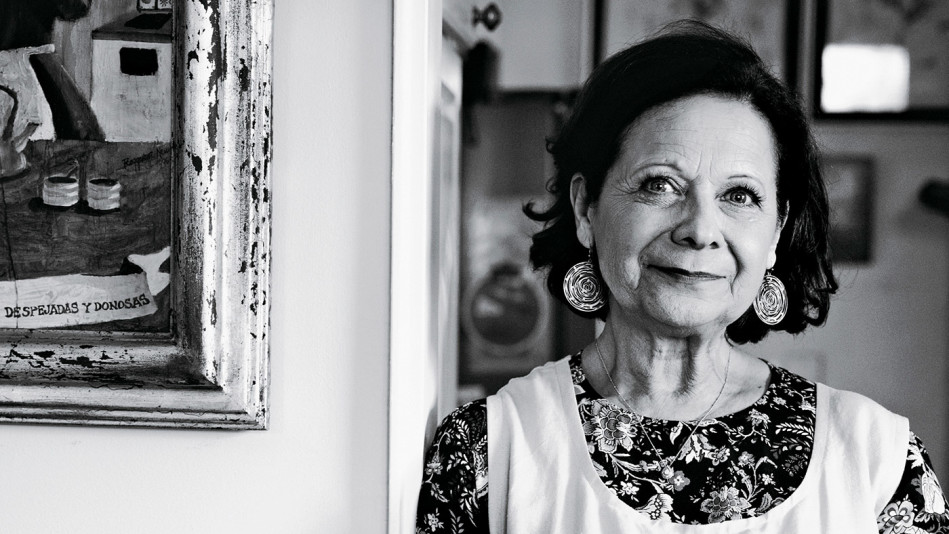
Photo: Eva Kolenko
As I pull apart a crisp yet densely pillowy samosa and heap it with spoonfuls of tangy tamarind chutney, I'm silently giving thanks to whatever forces conspired to land me here, in a living room in Queens, New York. Five strangers and I are sitting around the foldout wood dining table of a woman we met 15 minutes ago, when she padded to her front door in house slippers and hugged us hard. No, this isn't the world's weirdest Tinder date. It's a cooking class unlike any you may have clutched a spatula at: New York City's League of Kitchens (LOK) offers workshops led by female immigrants in their homes. Its stable of ten cooks, each from a different nation (Afghanistan, Argentina, Bangladesh, Greece, India, Japan, Lebanon, Mexico, Nepal and Uzbekistan), teach the dishes they grew up watching their mothers make. Here at Yamini Joshi's apartment in Kew Gardens, I'm sporting a red cotton apron in preparation for our vegetarian Indian lesson—we've come together to stuff baby eggplants with spices, chickpea flour and cilantro, then roll out roti on Yamini's spick-and-span countertops. Taking LOK classes is sort of like traveling, only without the jet lag and price tag, and with even-better food. For my first of three workshops, I arrived via a shuddering '30s-era elevator at the apartment of Damira Inatullaeva, the Uzbek instructor. She greeted me with a cherubic smile, in chandelier earrings and a jewel-toned ikat dress ("Traditional outfit," she explained, holding out the bright silk). The next weekend I went to fiery, pint-size Mirta Rinaldi's home in Forest Hills, to learn the secrets of Argentine grilling and check out her endless collection of mate gourds, the squat delivery system for the country's signature drink. At Yamini's house, I admire her shrine, where brass figurines nestle alongside illustrations of Hindu gods.
While the dishes differ wildly from class to class, the format is the same: Each starts with a welcome "snack" that's more giant, gorgeous feast than dainty nibble. At Damira's, we sat down to buns packed with egg and fresh dill, spice cake, heart-shaped sugar cookies, buoyant meat pies, dried melon and Uzbek raisins, which are like the American version's sexy cousin—bigger, juicier and bouncier than any other raisin I've had the pleasure of meeting. At Mirta's, we gazed in awe at slices of matambre (a rolled flank steak), seemingly 50 kinds of crackers, a rainbow of olives, tiny homemade toasts, cubes of Mirta's homemade quince paste and provoleta, a classic Argentine snack of melted cheese sprinkled with olive oil and oregano. "Please start eating," Mirta said, noticing our hesitation before the spread, "because I need your energy." She wasn't kidding: LOK offers both two- and five-and-a-half-hour immersive lessons in which you'll learn classic techniques, then dig into a gasp-inducing array of the dishes you spent the day creating.
The LOK students I mingled with were a cross section of New York: a couple just out of college, a gangly aspiring politician, a pair of female friends in workout clothes who were raised in Russian families, and soft-spoken Richard, whose wife bought him the class as a birthday present. At Yamini's, someone attempts to break the ice ("So what does everyone do for work?") while exotic, reedy music floats around us.
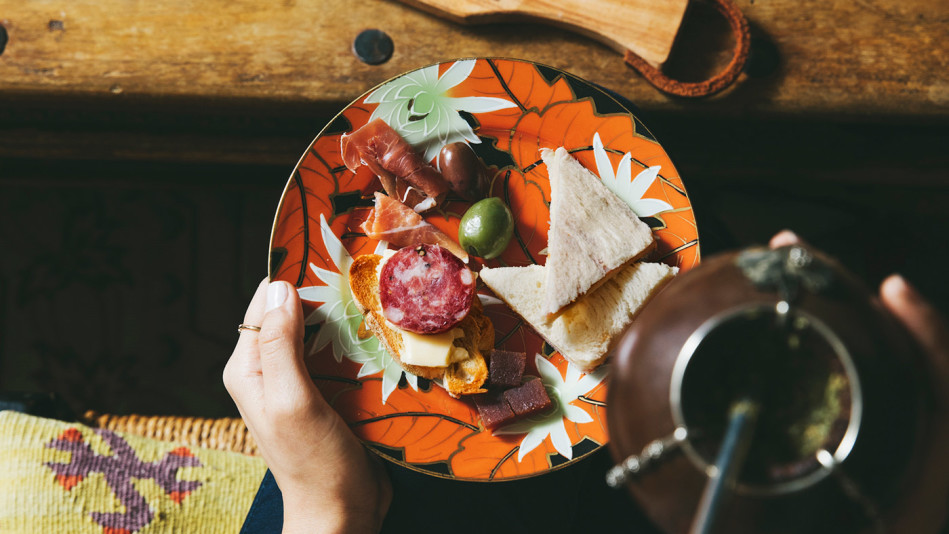
Snacking before the lesson begins.
New York City is the ideal home for LOK, given its status as cultural smorgasbord; the Endangered Language Alliance estimates that around 800 tongues are spoken here. Still, New Yorkers typically socialize with those who look and talk—and eat—like they do. "The city is so diverse," says LOK's founder and CEO, Lisa Gross, "but there are very few opportunities for meaningful connection, even between immigrant groups. Many of the interactions are service based: at a nail salon, a bodega, a restaurant. The League of Kitchens is about creating a deeper, more equal opportunity for exchange and learning. The instructor is expert, host, and teacher, which shifts the conventional power dynamic. I feel like the instructors are rock stars, and we give them an opportunity to share and shine."
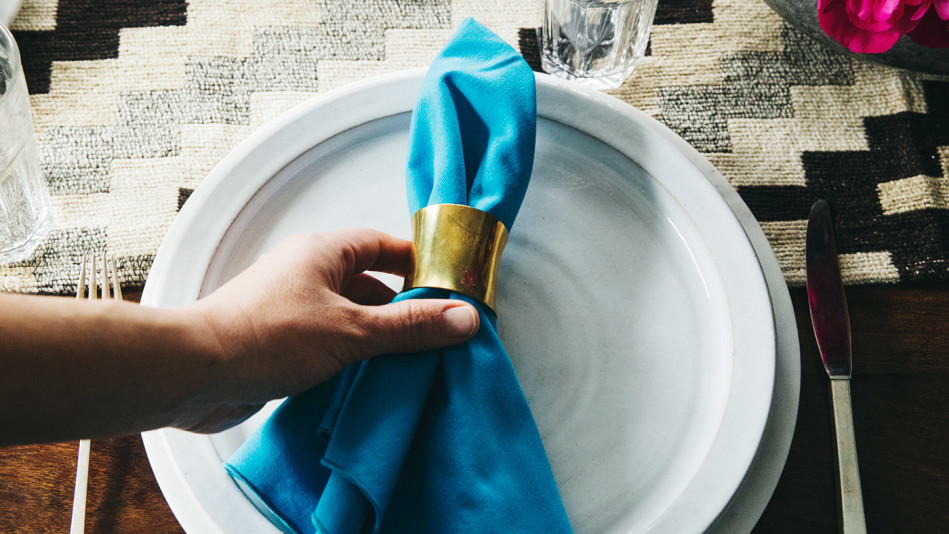
"Students often choose workshops for very personal reasons,” says LOK founder Lisa Gross. "Two women organized a private Lebanese workshop for their Lebanese dad's birthday because he'd been missing his mom's cooking. One man attended our Afghan workshop because he was marrying an Afghan woman and wanted to learn some recipes to surprise her."
LOK has organized more than 550 workshops since it opened its doors—or, more accurately, a bunch of women's doors—in 2014. The classes are a peek into countries you might have only glimpsed on CNN, places that never made your travel bucket list. Before going to Damira's, I would have been hard-pressed to gesture even near Uzbekistan on a map. But I was stunned by the photos she showed us of ornate cobalt-tiled mosques in Samarkand and the breathtaking '70s-retro subway system in Tashkent, Uzbekistan's capital and largest city. After I got home, I started feverishly Googling.
"Students often say that some part of the world that previously seemed kind of abstract now feels personal," says Gross. "Suddenly they care about news from that country. It's like, ‘Those could be Yamini's cousins or Damira's aunts and uncles.' If everyone could feel that about everyone else in the world, how profound would that be?"
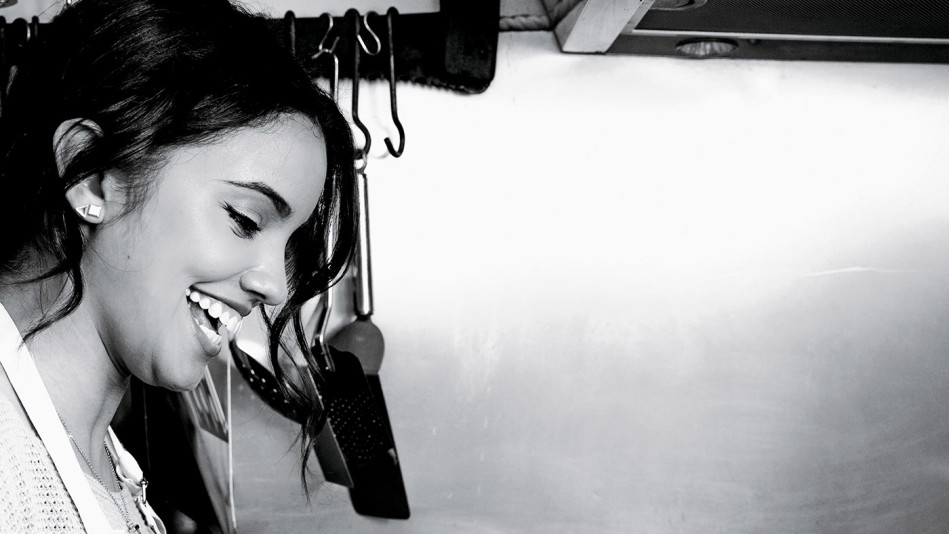
A student grills well-salted short ribs.
Gross is a product of a cross-cultural exchange herself: Her dad is descended from Hungarian Jews, and her mom immigrated from Korea in the early '70s. Her Korean grandmother lived with the family when Gross was growing up. "She cooked these incredible meals," she says. "But whenever I volunteered to help in the kitchen, she'd always shoo me away and say, ‘Go study. That's more important.' I never learned to cook from her, and neither did my mother, for the same reason."
Her grandmother died when Gross was 21. Once out of college, she developed an obsession with cooking, but she struggled to re-create her grandmother's dishes, even after poring over books and YouTube videos. "Nothing tasted right," she says. "I realized that so often, small nuances or tricks are the difference between something tasting good and tasting amazing. And those are things you really need to learn in person. I started fantasizing about finding another Korean grandmother to cook with. I thought, What if I could find fantastic women from all over the world living in New York City who'd teach you family recipes in their homes?"
After trying a pilot version with two cooks—one from Lebanon, the other from Bangladesh—Gross was one-hundred-percent certain about her vision and decided to launch it as a business. She took classes from all the major cooking schools in New York City to observe how they operated. Then she set out to find her culinary A-team.
Gross had several requirements for the instructors: They had to be immigrants, couldn't be professionally trained but needed a deep knowledge of food traditions, should be comfortable teaching in English, and had to be outgoing enough to share their personal stories and host strangers in their home. Also, their food had to be dream-about-it-that-night delicious. A tall order. "To find our first six instructors," says Gross, "I met about 120 people and probably did 20 cooking auditions. We needed women who'd create an experience where a student would go tell her friends, ‘I just had the most astounding food.'"
She let the teachers dictate which cuisines LOK would offer. "Sometimes they're from countries I would never have actively gone after," says Gross. "A perfect example is Mirta. I was so blown away by her personality and her passion for food and culture. She did an in-home cooking audition, where I tasted her homemade mayonnaise and milanesa de pollo. And though Argentinian cooking wasn't really on my radar, I was like, okay, I guess we're going to offer it because I have to hire her."
Most LOK instructors are over 50, and their old-world ethos is still very much in play. In Yamini's class, she repeatedly reminds us, "No waste, nothing wasted," while monitoring how we scoop up the leftover spicy masala stuffing and return it to the mixing bowl. Later she tells us that when she's alone and finishes eating, she pours a bit of hot water into her metal thali plate, swirls it around, then drinks it to ingest every possible nutrient. "People may think it's really strange," she says with a slightly embarrassed smile, "but it's how my grandfather taught me."
And I was intrigued by Damira's wisdom on the transformative power of cabbage: "If you have a pain, you can wrap a leaf around it, and it will feel much better," she explained to our group, demo-ing the concept on her forearm, to a few raised eyebrows.
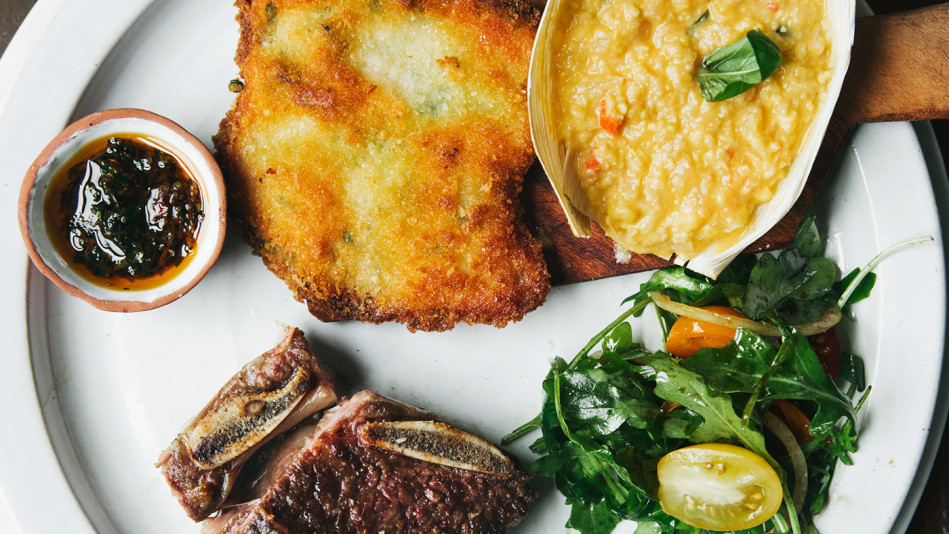
Mirta's homemade chimichurri (in the small round dish) is her secret weapon: a blend of minced parsley and garlic, crushed red pepper flakes, spices, balsamic vinegar and many generous glugs of olive oil. "You come home exhausted, marinate any meat or vegetables in this, and you're all set," she says. "It's a magical thing."
Mirta started our workshop (her 57th with LOK) the same way she always does—with a traditional Argentine mate ceremony. She showed us how to prepare the dried leaves in the gourd-shaped container, hold it at an angle and fill it with hot water, then sprinkle in granulated sugar to cut the bitterness. While we prepped the humitas, a savory corn pudding flecked with fresh basil, Mirta showed us how she grates kernels off the cob, then vigorously scrapes it with the back of a knife, removing every yellow speck and drop of juice. Next, she set aside the bare cobs, explaining that she'd use them as a starter for soup another day. "This is what people in my family have always done," she said firmly. Her kitchen is stuffed to the gills with wooden trays, grill pans, and ceramic dishes that are precariously stacked like a game of culinary Jenga. After the humitas were finished, Mirta needed room to grill meat on her stove top, so she took the large frying pan that had been parked there out to her apartment balcony, where she left it on the floor near some potted plants. At dinner, she served the humitas in dried corn husks she had deftly crafted into elegant little bowls. When a student asked whether they were difficult to make, Mirta admitted, "They take a long time. But I do them while I watch my programs—I did these in front of Grey's Anatomy."
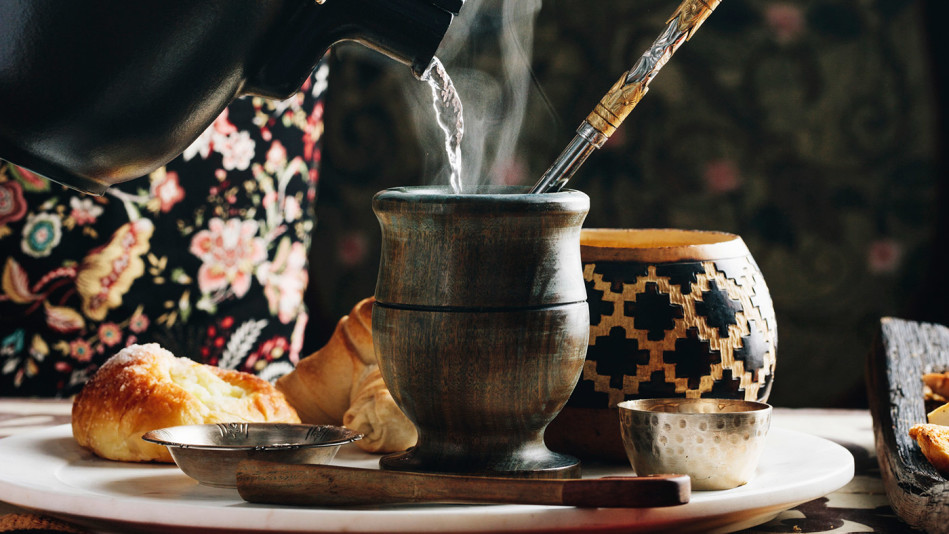
The all-important mate ceremony.
While millions of women across the globe are responsible for putting food on their family's table, many of them doubtless see their labor not as an art form, but as a necessity. "American food culture often centers around adulation of white male restaurant chefs," says Gross. "But most of the cooking that happens every day is done by women who aren't recognized or compensated for it. After our workshops, students will give written feedback like ‘She was so inspiring,' and we'll pass that on to the instructors. A number of them told us, ‘I read that to my kids, and they were like, "Wow, Mom, we've really been taking you for granted—we didn't realize how amazing you are."' This is a way to honor them."
In 2018, LOK's mission to glorify women's—particularly immigrant women's—expertise and general badassery seems especially pressing. "There's so much negative rhetoric about immigrants in today's political climate," says Gross. "Even the language used about them: words that describe either natural disasters or insects, like a ‘flood' of immigrants or that they're ‘taking over.' Much of what LOK is about is recognizing and celebrating the incredible contributions immigrants make to our country, our society, our food culture. And just humanizing them as people with families, who watch TV, who came here to give their kids more opportunities."
After nearly six hours wandering around a stranger's home, it's tough not to feel closer to her; at every class, I eventually started daydreaming that the teacher and I would get together to hang out off the clock. The instructors' maternal tenderness only reinforced that impulse. At Yamini's, while we take a break, she turns to all of us to affirm, "Today you are not my guests. We cooked in the kitchen together, so we belong to each other as a family now. I'm really thankful for that."
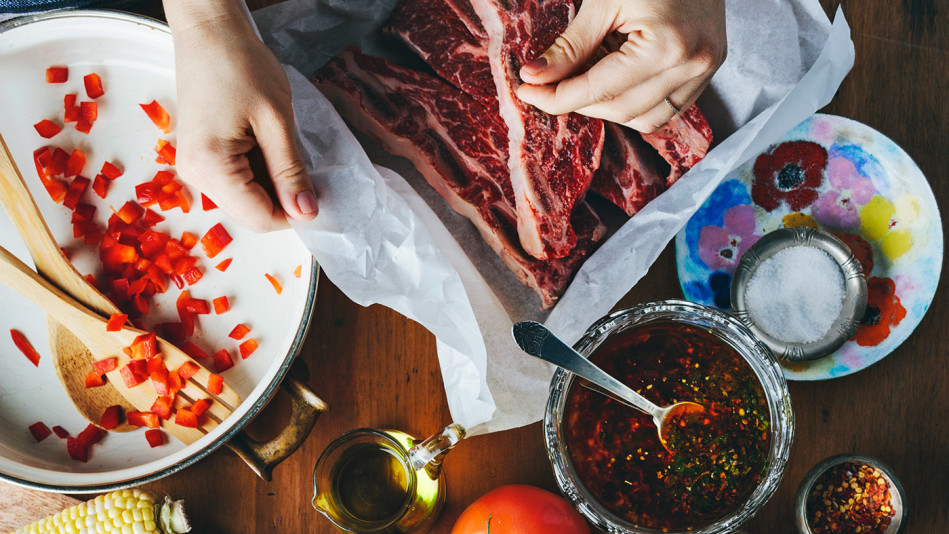
Mirta dices a fresh red pepper. "My daughter was skeptical about me doing the classes," she recalls. "She said, 'Mom, how are you going to manage so many strangers and keep your own tempo?' But I said, 'Once I’m in the kitchen, I'll control the flow.'"
As we finish our cooking, my fellow students start to feel like pals, too, all of us a little punchy, our forearms aching from kneading dough. But I witness something far more intimate than I do at my typical neighborhood dinner party when Yamini places a full plate of food on her Hindu altar, then lights musk incense and steps out of her slippers. She rings a bell, breathes deeply, and, after three long oms, sings a prayer with her eyes closed, hands clasped at her chin. By now the other students have stopped toasting roti and are quietly watching as Yamini whisks the incense smoke toward images of Ganesha and Vishnu on the altar.
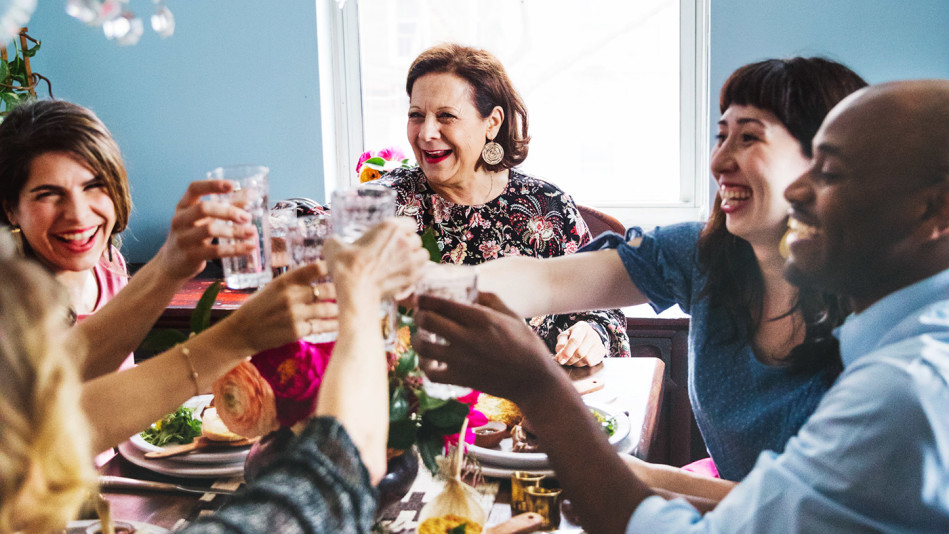
Savoring a job well-done at Mirta's.
The results of our kneading and chopping and grating provoke similar responses in each workshop: happily dumbstruck people, dusted with flour or dabbed with oil, murmuring a chorus of "This is so good." At Mirta's, we sliced into perfectly charred short ribs and grilled chorizo, then gobbled down alfajores, delicate butter cookies oozing with dulce de leche and bedecked with fluffy shredded coconut. She was feeling nostalgic, telling us a story about one particularly treasured family memento. "Years ago, my mother came to visit, and I asked her to make my favorite cake," she said. "It's a long process, so I put a video camera on the counter and taped the whole thing. It was hilarious—she was such a pro, looking at the camera like, ‘Now six eggs.' I made copies and gave one to every member of my family so that recipe won't die. It's so easy today to turn on your phone and make a video of your aunt, your mom, your cousin cooking. It's important. Tape it. Save it. And if you can't," she smiled, "you can take one of my classes."
While the dishes differ wildly from class to class, the format is the same: Each starts with a welcome "snack" that's more giant, gorgeous feast than dainty nibble. At Damira's, we sat down to buns packed with egg and fresh dill, spice cake, heart-shaped sugar cookies, buoyant meat pies, dried melon and Uzbek raisins, which are like the American version's sexy cousin—bigger, juicier and bouncier than any other raisin I've had the pleasure of meeting. At Mirta's, we gazed in awe at slices of matambre (a rolled flank steak), seemingly 50 kinds of crackers, a rainbow of olives, tiny homemade toasts, cubes of Mirta's homemade quince paste and provoleta, a classic Argentine snack of melted cheese sprinkled with olive oil and oregano. "Please start eating," Mirta said, noticing our hesitation before the spread, "because I need your energy." She wasn't kidding: LOK offers both two- and five-and-a-half-hour immersive lessons in which you'll learn classic techniques, then dig into a gasp-inducing array of the dishes you spent the day creating.
The LOK students I mingled with were a cross section of New York: a couple just out of college, a gangly aspiring politician, a pair of female friends in workout clothes who were raised in Russian families, and soft-spoken Richard, whose wife bought him the class as a birthday present. At Yamini's, someone attempts to break the ice ("So what does everyone do for work?") while exotic, reedy music floats around us.

Snacking before the lesson begins.
New York City is the ideal home for LOK, given its status as cultural smorgasbord; the Endangered Language Alliance estimates that around 800 tongues are spoken here. Still, New Yorkers typically socialize with those who look and talk—and eat—like they do. "The city is so diverse," says LOK's founder and CEO, Lisa Gross, "but there are very few opportunities for meaningful connection, even between immigrant groups. Many of the interactions are service based: at a nail salon, a bodega, a restaurant. The League of Kitchens is about creating a deeper, more equal opportunity for exchange and learning. The instructor is expert, host, and teacher, which shifts the conventional power dynamic. I feel like the instructors are rock stars, and we give them an opportunity to share and shine."

"Students often choose workshops for very personal reasons,” says LOK founder Lisa Gross. "Two women organized a private Lebanese workshop for their Lebanese dad's birthday because he'd been missing his mom's cooking. One man attended our Afghan workshop because he was marrying an Afghan woman and wanted to learn some recipes to surprise her."
LOK has organized more than 550 workshops since it opened its doors—or, more accurately, a bunch of women's doors—in 2014. The classes are a peek into countries you might have only glimpsed on CNN, places that never made your travel bucket list. Before going to Damira's, I would have been hard-pressed to gesture even near Uzbekistan on a map. But I was stunned by the photos she showed us of ornate cobalt-tiled mosques in Samarkand and the breathtaking '70s-retro subway system in Tashkent, Uzbekistan's capital and largest city. After I got home, I started feverishly Googling.
"Students often say that some part of the world that previously seemed kind of abstract now feels personal," says Gross. "Suddenly they care about news from that country. It's like, ‘Those could be Yamini's cousins or Damira's aunts and uncles.' If everyone could feel that about everyone else in the world, how profound would that be?"

A student grills well-salted short ribs.
Gross is a product of a cross-cultural exchange herself: Her dad is descended from Hungarian Jews, and her mom immigrated from Korea in the early '70s. Her Korean grandmother lived with the family when Gross was growing up. "She cooked these incredible meals," she says. "But whenever I volunteered to help in the kitchen, she'd always shoo me away and say, ‘Go study. That's more important.' I never learned to cook from her, and neither did my mother, for the same reason."
Her grandmother died when Gross was 21. Once out of college, she developed an obsession with cooking, but she struggled to re-create her grandmother's dishes, even after poring over books and YouTube videos. "Nothing tasted right," she says. "I realized that so often, small nuances or tricks are the difference between something tasting good and tasting amazing. And those are things you really need to learn in person. I started fantasizing about finding another Korean grandmother to cook with. I thought, What if I could find fantastic women from all over the world living in New York City who'd teach you family recipes in their homes?"
After trying a pilot version with two cooks—one from Lebanon, the other from Bangladesh—Gross was one-hundred-percent certain about her vision and decided to launch it as a business. She took classes from all the major cooking schools in New York City to observe how they operated. Then she set out to find her culinary A-team.
Gross had several requirements for the instructors: They had to be immigrants, couldn't be professionally trained but needed a deep knowledge of food traditions, should be comfortable teaching in English, and had to be outgoing enough to share their personal stories and host strangers in their home. Also, their food had to be dream-about-it-that-night delicious. A tall order. "To find our first six instructors," says Gross, "I met about 120 people and probably did 20 cooking auditions. We needed women who'd create an experience where a student would go tell her friends, ‘I just had the most astounding food.'"
She let the teachers dictate which cuisines LOK would offer. "Sometimes they're from countries I would never have actively gone after," says Gross. "A perfect example is Mirta. I was so blown away by her personality and her passion for food and culture. She did an in-home cooking audition, where I tasted her homemade mayonnaise and milanesa de pollo. And though Argentinian cooking wasn't really on my radar, I was like, okay, I guess we're going to offer it because I have to hire her."
Most LOK instructors are over 50, and their old-world ethos is still very much in play. In Yamini's class, she repeatedly reminds us, "No waste, nothing wasted," while monitoring how we scoop up the leftover spicy masala stuffing and return it to the mixing bowl. Later she tells us that when she's alone and finishes eating, she pours a bit of hot water into her metal thali plate, swirls it around, then drinks it to ingest every possible nutrient. "People may think it's really strange," she says with a slightly embarrassed smile, "but it's how my grandfather taught me."
And I was intrigued by Damira's wisdom on the transformative power of cabbage: "If you have a pain, you can wrap a leaf around it, and it will feel much better," she explained to our group, demo-ing the concept on her forearm, to a few raised eyebrows.

Mirta's homemade chimichurri (in the small round dish) is her secret weapon: a blend of minced parsley and garlic, crushed red pepper flakes, spices, balsamic vinegar and many generous glugs of olive oil. "You come home exhausted, marinate any meat or vegetables in this, and you're all set," she says. "It's a magical thing."
Mirta started our workshop (her 57th with LOK) the same way she always does—with a traditional Argentine mate ceremony. She showed us how to prepare the dried leaves in the gourd-shaped container, hold it at an angle and fill it with hot water, then sprinkle in granulated sugar to cut the bitterness. While we prepped the humitas, a savory corn pudding flecked with fresh basil, Mirta showed us how she grates kernels off the cob, then vigorously scrapes it with the back of a knife, removing every yellow speck and drop of juice. Next, she set aside the bare cobs, explaining that she'd use them as a starter for soup another day. "This is what people in my family have always done," she said firmly. Her kitchen is stuffed to the gills with wooden trays, grill pans, and ceramic dishes that are precariously stacked like a game of culinary Jenga. After the humitas were finished, Mirta needed room to grill meat on her stove top, so she took the large frying pan that had been parked there out to her apartment balcony, where she left it on the floor near some potted plants. At dinner, she served the humitas in dried corn husks she had deftly crafted into elegant little bowls. When a student asked whether they were difficult to make, Mirta admitted, "They take a long time. But I do them while I watch my programs—I did these in front of Grey's Anatomy."

The all-important mate ceremony.
While millions of women across the globe are responsible for putting food on their family's table, many of them doubtless see their labor not as an art form, but as a necessity. "American food culture often centers around adulation of white male restaurant chefs," says Gross. "But most of the cooking that happens every day is done by women who aren't recognized or compensated for it. After our workshops, students will give written feedback like ‘She was so inspiring,' and we'll pass that on to the instructors. A number of them told us, ‘I read that to my kids, and they were like, "Wow, Mom, we've really been taking you for granted—we didn't realize how amazing you are."' This is a way to honor them."
In 2018, LOK's mission to glorify women's—particularly immigrant women's—expertise and general badassery seems especially pressing. "There's so much negative rhetoric about immigrants in today's political climate," says Gross. "Even the language used about them: words that describe either natural disasters or insects, like a ‘flood' of immigrants or that they're ‘taking over.' Much of what LOK is about is recognizing and celebrating the incredible contributions immigrants make to our country, our society, our food culture. And just humanizing them as people with families, who watch TV, who came here to give their kids more opportunities."
After nearly six hours wandering around a stranger's home, it's tough not to feel closer to her; at every class, I eventually started daydreaming that the teacher and I would get together to hang out off the clock. The instructors' maternal tenderness only reinforced that impulse. At Yamini's, while we take a break, she turns to all of us to affirm, "Today you are not my guests. We cooked in the kitchen together, so we belong to each other as a family now. I'm really thankful for that."

Mirta dices a fresh red pepper. "My daughter was skeptical about me doing the classes," she recalls. "She said, 'Mom, how are you going to manage so many strangers and keep your own tempo?' But I said, 'Once I’m in the kitchen, I'll control the flow.'"
As we finish our cooking, my fellow students start to feel like pals, too, all of us a little punchy, our forearms aching from kneading dough. But I witness something far more intimate than I do at my typical neighborhood dinner party when Yamini places a full plate of food on her Hindu altar, then lights musk incense and steps out of her slippers. She rings a bell, breathes deeply, and, after three long oms, sings a prayer with her eyes closed, hands clasped at her chin. By now the other students have stopped toasting roti and are quietly watching as Yamini whisks the incense smoke toward images of Ganesha and Vishnu on the altar.

Savoring a job well-done at Mirta's.
The results of our kneading and chopping and grating provoke similar responses in each workshop: happily dumbstruck people, dusted with flour or dabbed with oil, murmuring a chorus of "This is so good." At Mirta's, we sliced into perfectly charred short ribs and grilled chorizo, then gobbled down alfajores, delicate butter cookies oozing with dulce de leche and bedecked with fluffy shredded coconut. She was feeling nostalgic, telling us a story about one particularly treasured family memento. "Years ago, my mother came to visit, and I asked her to make my favorite cake," she said. "It's a long process, so I put a video camera on the counter and taped the whole thing. It was hilarious—she was such a pro, looking at the camera like, ‘Now six eggs.' I made copies and gave one to every member of my family so that recipe won't die. It's so easy today to turn on your phone and make a video of your aunt, your mom, your cousin cooking. It's important. Tape it. Save it. And if you can't," she smiled, "you can take one of my classes."



